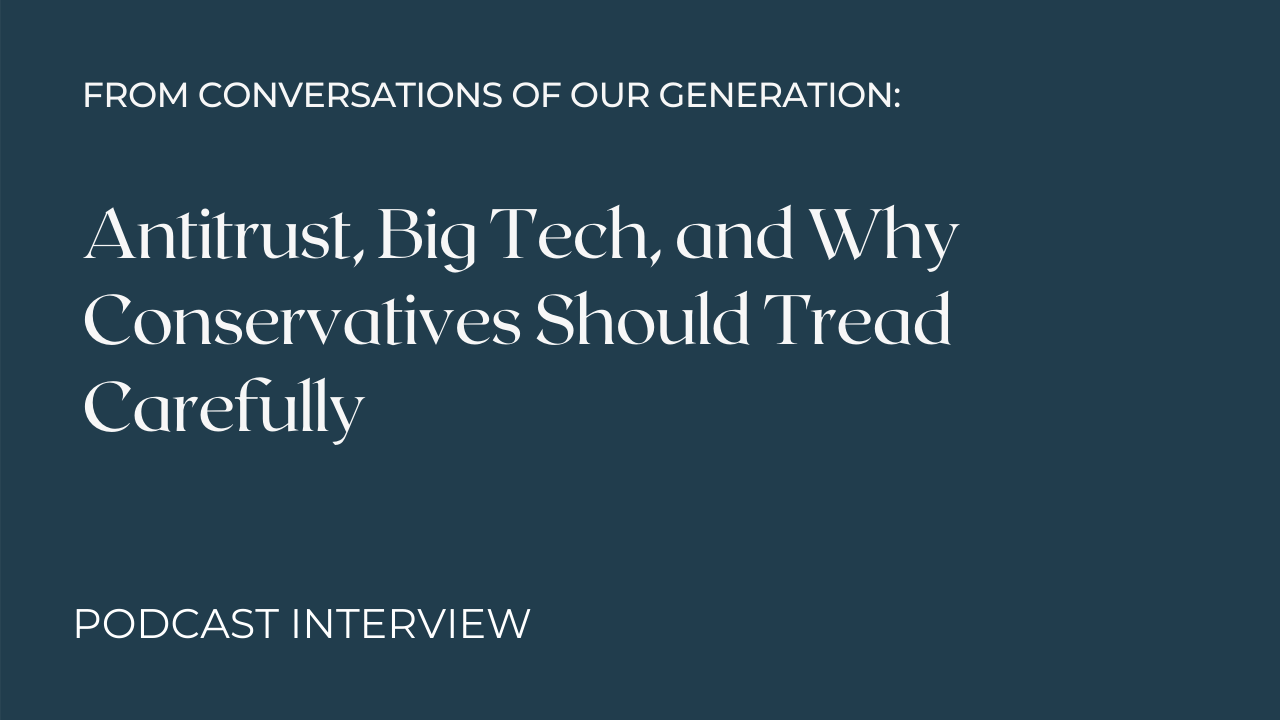
Urging a “No” on H.R. 3843, the "Merger Filing Fee Modernization Act"
The following memo was sent to members of the U.S. House of Representatives and their staff, opposing H.R. 3843, the "Merger Filing Fee Modernization Act."

Congressional Briefing on Antitrust Enforcement: What If? Consequences of Proposed Antitrust Legislation
Experts will discuss the consequences of current proposals, including how they would play out from an enforcement perspective, and why certain proposals are an affront to the rule of law.

Upcoming Event: Antitrust and the Rule of Law: Past, Present, and Future
This event will feature two panel discussions with experts on key issues in antitrust law, followed by a reception for attendees.

Statement for the Record on Hearing: ‘Transforming the FTC: Legislation to Modernize Consumer Protection’
On July 1, 2021, the Federal Trade Commission (FTC), after allowing six days for public comment, voted to rescind the 2015 Statement of Enforcement Principles Regarding “Unfair Methods of Competition” (UMC) Under Section 5 of the FTC Act. On July 21, 2021, the FTC voted to rescind its bipartisan 1995 Policy Statement on Prior Approval and Prior Notice Provisions in merger cases.
Notably, both of these actions – along with other significant changes – were effected along party lines, with limited opportunity for public input, and without dialogue among the Commissioners. Today’s hearing will consider a wide array of reforms, many of which are relevant to the level of discretion and enforcement principles under FTC Act § 5 and to the broader capabilities and mandate of the Commission.
Comments In Re: Rescission of 1995 FTC Statement on Prior Approval and Prior Notice Provisions
It is troubling that the FTC will be considering a significant shift in policy as the open meeting agenda will include this sudden push to revoke the 1995 statement. Of particular concern is the rejection of the prior approval provision.
With the adoption of the 1995 statement, the Commission accepted the Hart-Scott-Rodino (HSR) Act framework as adequate for handling mergers and thereby determined that prior approval of future acquisitions by a respondent should no longer be required as a routine matter.
The rescission of the 1995 statement is another step in the direction of rejecting the HSR regime which, in the words of Peter W. Rodino, Jr on the 25th anniversary of the Act, “absolutely has transformed merger enforcement. Competition, as well as the consumer, has benefitted.”

Comments In Re: Rescission of 2015 FTC Statement on Unfair Methods of Competition
Abandoning the 2015 statement’s framework would remove important guardrails that established predictability and guidance in enforcement actions. The lack of predictability resulting from the FTC’s re-expanded discretion in invoking broad Section 5 authority on a case-by-case basis would create uncertainty for businesses of all sizes and across all industries. The Commission’s misadventure into UMC expansionism would generate unwarranted confusion, and eventually courts would have to grapple with questions of interpreting the outer boundaries of Section 5 authority that were previously cabined by the 2015 statement.

Breaking Down the House Judiciary Antitrust Bills and Amendments
The majority has scheduled a full-committee mark-up less than two weeks after unveiling the bills and less than 48 hours after disclosing new versions to be offered as substitute amendments. The majority is selling out conservatives in order to ram their whole package through. These are serious changes to a broad area of law that deserve serious consideration. It is clear that House Democrats never intended to allow that to be the case.
In fact, they have even admitted to such strategies. For example, Chairman Cicilline told the New York Times that in the markup, he’ll take up measures with the most agreement first and worse legislation later. At least the quiet parts are sometimes said out loud.
Contrast this with the fact that this was preceded by a more than 16-month investigation, about a dozen hearings, a 450+ page report, and the fact that there have been nine months following the report’s publication. Now that the details to proposed solutions have been drafted without meaningful Republican collaboration, the committee is moving about a month after a partisan report was reported out of committee without a single GOP vote.

Antitrust and Big Tech: Does New Technology Call for New Rules?
Recently, Senator Amy Klobuchar (D-MN) introduced a bill that would overhaul the past forty-five years of antitrust law by rewriting legal standards, changing guidelines for mergers, and expanding the government’s civil penalty authority. Additionally, the House Judiciary Committee conducted its own investigation and released a report on competition in the digital market.

The Conservative Case Against Weaponizing Antitrust Law
Today, the consumer welfare standard remains one of the greatest success stories of the conservative legal movement. However, recent sentiments within both parties have attracted proposals that would mark a return to highly-interventionist, pre-1970s jurisprudence in which the “sole consistency,” as Justice Potter Stewart famously said, “is that the government always wins.” Our panel of experts discuss these proposals, their implications, and the best path forward for conservatives.

Event Video: The Antitrust Cases Against Facebook: Examining the Lawsuits and Implications
Our panel of experts discuss the antitrust lawsuits against Facebook, the merger review process and FTC enforcement, and assess the implications for consumers, companies, and the law.

Virtual Panel Discussion: New Technologies, Same Principles: The Conservative Case Against Weaponizing Antitrust Law
During the 1986 Supreme Court confirmation hearings for then-Judge Antonin Scalia, he was asked about his views on antitrust. “In law school, I never understood [antitrust law],” Scalia explained, “I later found out, in reading the writings of those who now do understand it, that I should not have understood it because it did not make any sense then.” This much-needed coherency in antitrust law was brought about by the adoption of the consumer welfare standard. The intersection of economic analysis and the law provided a neutral underlying principle that allowed conservatives to reign in a broad, unprincipled area of the law that was once used as a political and socioeconomic tool.
Today, this remains one of the greatest success stories of the conservative legal movement. However, recent sentiments within both parties have attracted proposals that would mark a return to highly-interventionist, pre-1970s jurisprudence in which the “sole consistency,” as Justice Potter Stewart famously said, “is that the government always wins.” Our panel of experts will discuss these proposals, their implications, and the best path forward for conservatives.

Virtual Panel Discussion: The Antitrust Cases Against Facebook: Examining the Lawsuits and Implications
Last week, the Federal Trade Commission (FTC) and a coalition of 48 state attorneys general filed two separate lawsuits against Facebook. The complaints argued that the company maintained a monopoly position in the “personal social media networking” market through a series of acquisitions over the past decade intended to buy up potential rivals and by imposing restrictive policies to hinder companies that present competitive threats. Both suits call for the divestiture of Instagram and WhatsApp, along with other proposed remedies. Our panel of experts will discuss the lawsuits, the merger review process and FTC enforcement, and assess the implications for consumers, companies, and the law.

